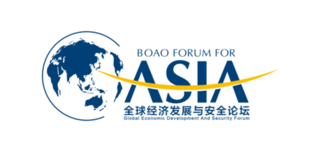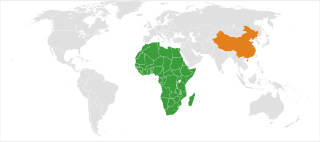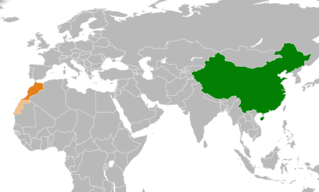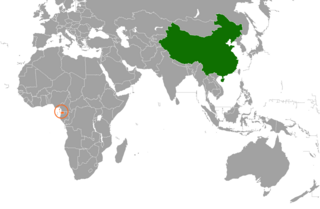
The Boao Forum for Asia, initiated by 25 Asian countries and Australia, is a nonprofit that hosts high-level forums for leaders from government, business and academia in Asia and other continents to share their vision on the most pressing issues in this region and the world at large. Though its fixed address is in Bo'ao, Hainan province, China, its Secretariat is based in Beijing. The forum, sometimes known as the “Asian Davos”, takes its name from the town of Boao, located in China's southern Hainan province, which has been the permanent venue for its annual conference since 2002.

The Ministry of Commerce (MOFCOM) is an executive department of the State Council of the People's Republic of China that is responsible for formulating policy on foreign trade, export and import regulations, foreign direct investments, consumer protection, market competition and negotiating bilateral and multilateral trade agreements. it is the 20th-ranking department of the State Council. The current minister is Wang Wentao.
Go Out policy or the Going Global Strategy is the People's Republic of China's current strategy to encourage its enterprises to invest overseas. The policy was announced as a national strategy by Jiang Zemin in March 2000.

Relations between Angola and China predate the former's independence. Today, they are based on an emerging trade relationship. As of 2021, Angola was China's third-largest trading partner in Africa. The two countries announced a comprehensive strategic partnership in 2024.

China–Sudan relations are the bilateral relations between the People's Republic of China and the Republic of Sudan. China is currently one of Sudan's largest trade partners, importing oil and exporting low cost manufactured items as well as armaments into the country. Both states enjoy a very robust and productive relationship in the fields of diplomacy, economic trade, and political strategy. They formally established diplomatic relations on February 4, 1959, when Sudan formally recognized the sovereignty of the People's Republic of China and have since become close global allies, supporting each other in times of internal crises and international controversy such as during the Second Sudanese Civil War, the Darfur Crisis, and the Xinjiang Conflict. China continues to provide massive support to Sudan by developing its oil resources and supplying millions of dollars in loans, aid, foreign direct investments, and humanitarian assistance. In return, Sudan has become a reliable political and economic ally in the international arena, allowing China to maintain a significant stake in its oil sector.
The String of Pearls is a geopolitical hypothesis proposed by United States political researchers in 2004. The term refers to the network of Chinese military and commercial facilities and relationships along its sea lines of communication, which extend from the Chinese mainland to Port Sudan in the Horn of Africa. The sea lines run through several major maritime choke points such as the Strait of Mandeb, the Strait of Malacca, the Strait of Hormuz, and the Lombok Strait as well as other strategic maritime centres in Somalia and the littoral South Asian countries of Pakistan, Sri Lanka, Bangladesh, and the Maldives.

Sino–African relations, also referred to as Africa–China relations or Afro–Chinese relations, are the historical, political, economic, military, social, and cultural connections between China and the African continent.
The National Bureau of Asian Research (NBR) is an American non-profit research institution based in Seattle, Washington, with a branch office in Washington, D.C.

Relations between the European Union and the Republic of India are currently defined by the 1994 EU–India Cooperation Agreement. The EU is a significant trade partner for India and the two sides have been attempting to negotiate a free trade deal since 2007. Indo-EU bilateral trade stood at US$104.3 billion in the financial year 2018–19.

Algeria and China have traditionally strong relations, celebrating the 60th anniversary of the establishment of diplomatic relations in 2018. In 2010, relations were considered the strongest of all Arab-Chinese relations behind Sudanese-Chinese relations. While relations are firmly grounded in commercial ties, diplomatic relations have notably extended into socio-cultural and political spheres.

People's Republic of China – Zambia relations refers to the current and historical relationship between the People's Republic of China (PRC) and Zambia.

The Africa Center for Strategic Studies (ACSS) is self-described as "a U.S. Department of Defense institution established and funded by Congress for the study of security issues relating to Africa and serving as a forum for bilateral and multilateral research, communication, and exchange of ideas involving military and civilian participants."

The Duke-UNC China Leadership Summit (CLS) is an annual student conference that brings together distinguished student leaders and eminent individuals in the fields of academia, politics and business to examine the rise of China.
Kent E. Calder was the interim dean of the Johns Hopkins School of Advanced International Studies (SAIS), serves as the director of the Edwin O. Reischauer Center for East Asian Studies, and is also the Edwin O. Reischauer Professor of East Asian Studies at SAIS. Calder previously served as the vice dean for faculty affairs and international research cooperation at SAIS.

China–Morocco relations refer to the bilateral relations between China and Morocco. China and Morocco established diplomatic relations on November 1, 1958. Morocco establishes 'strategic partnership' with China in 2016, stronger partnership with China is sign that Morocco is seeking political and economic partners far from its traditional markets.

China–Equatorial Guinea relations refer to the foreign relations between China and Equatorial Guinea. China and Equatorial Guinea established diplomatic relations on October 15, 1970. Following a coup-d’état which brought current president Teodoro Obiang Nguema Mbasogo to power, diplomatic relations were temporarily suspended and resumed again in 1985.

The Belt and Road Initiative, known in China as the One Belt One Road and sometimes referred to as the New Silk Road, is a global infrastructure development strategy adopted by the Chinese government in 2013 to invest in more than 150 countries and international organizations. The BRI is composed of six urban development land corridors linked by road, rail, energy, and digital infrastructure and the Maritime Silk Road linked by the development of ports.
Debt-trap diplomacy is a term to describe an international financial relationship where a creditor country or institution extends debt to a borrowing nation partially, or solely, to increase the lender's political leverage. The creditor country is said to extend excessive credit to a debtor country with the intention of extracting economic or political concessions when the debtor country becomes unable to meet its repayment obligations. The conditions of the loans are often not publicized. The borrowed money commonly pays for contractors and materials sourced from the creditor country.
The People's Republic of China emerged as a great power and one of the three big players in the tri-polar geopolitics (PRC-US-USSR) during the Cold War, after the Korean War in 1950-1953 and the Sino-Soviet split in the 1960s, with its status as a recognized nuclear weapons state in 1960s. Currently, China has one of the world's largest populations, second largest GDP (nominal) and the largest economy in the world by PPP.
Deborah Bräutigam is an American political scientist, currently the Bernard L. Schwartz Professor of Political Economy at Johns Hopkins University and the Director of the China Africa Research Initiative at the Paul H. Nitze School of Advanced International Studies. Bräutigam studies international development policies and foreign aid, focusing on Chinese projects in Africa.













